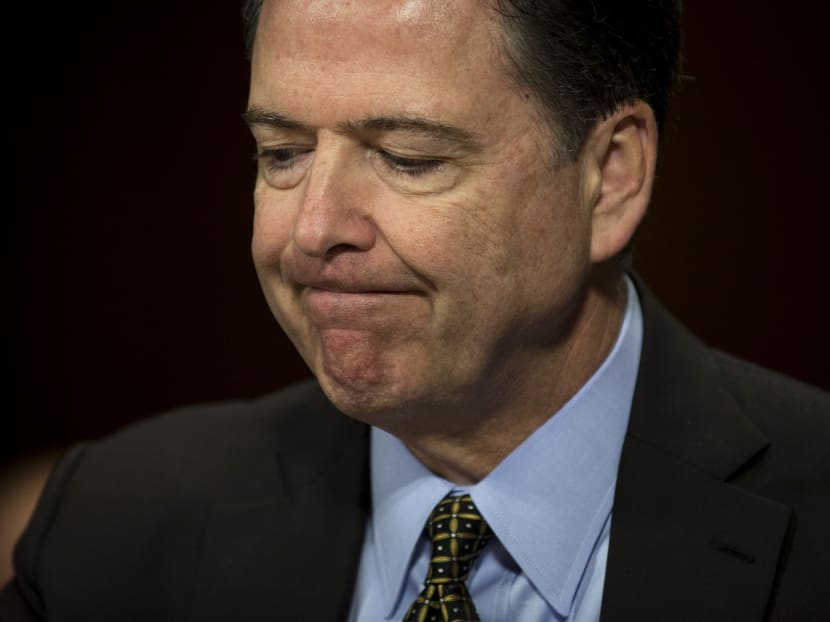FBI’s acting chief says Comey has broad support, contradicting Trump
WASHINGTON — Acting Federal Bureau of Investigation (FBI) director Andrew McCabe last night contradicted the White House’s assertion that Mr James Comey, the agency director fired by President Donald Trump earlier this week, had lost the support of rank-and-file agents, setting up a collision course with the administration.
WASHINGTON — Acting Federal Bureau of Investigation (FBI) director Andrew McCabe last night contradicted the White House’s assertion that Mr James Comey, the agency director fired by President Donald Trump earlier this week, had lost the support of rank-and-file agents, setting up a collision course with the administration.
“Director Comey enjoyed broad support within the FBI, and still does to this day,” Mr McCabe said when testifying before the Senate Intelligence Committee, a pointed rebuke of what had been one of the President’s main defences for the sacking.
“The vast majority of FBI employees enjoyed a deep and positive connection to Director Comey,” he added.
He also stated that the sacking of Mr Comey has not affected an investigation into whether any of Mr Trump’s associates colluded with Russians to influence the 2016 presidential election, while assuring senators that he would alert them of any effort to interfere in the probe.
“The work of the men and women of the FBI continues despite any changes in circumstances,” he said in response to a question from Republican Senator Marco Rubio.
“There has been no effort to impede our investigation to date. Simply put, you cannot stop the men and women of the FBI from doing the right thing.”
Mr Trump’s dismissal of Mr Comey on Tuesday has raised concerns from both Democrats and Republicans about the future of the investigation.
A White House official said Mr Trump is weighing going to the FBI headquarters in Washington today as a show of his commitment to the bureau, although he is not expected to discuss the Russian investigation.
Regardless, days before he was fired, Mr Comey had asked the Justice Department for more prosecutors and other personnel to accelerate the investigation into Russia’s interference in the presidential election.
It was the first clear-cut evidence that Mr Comey believed the bureau needed more resources to handle a sprawling and highly politicised counter-intelligence investigation.
It was unclear whether word of Mr Comey’s request, put to Deputy Attorney-General Rod Rosenstein, ever made its way to Mr Trump.
But the revelation intensified the pressure on the White House from both political parties to explain the motives behind Mr Comey’s stunning ouster.
Mr Trump is the first president since Richard Nixon to dismiss a law enforcement official overseeing an investigation with ties to the White House. Democrats quickly accused Mr Trump of using Mr Comey’s handling of the Hillary Clinton email investigation as a pretext, and called for a special prosecutor into the Russia probe.
Republican leaders brushed off the idea as unnecessary, with Senate Majority Leader Mitch McConnell saying a new investigation would only “impede the current work being done”.
Mr Comey’s dismissal appears to have imbued the Senate Intelligence Committee with a renewed sense of urgency.
The committee issued its first subpoena in the Russian investigation on Wednesday, ordering former national security adviser Michael Flynn to hand over records of any emails, phone calls, meetings and financial dealings with Russians.
In a farewell letter to FBI agents, Mr Comey said he would not dwell on the reasons for his dismissal, or how it was carried out. However, White House officials said the turning point came when Mr Comey refused a request from Mr Trump, Attorney-General Jeff Sessions and Mr Rosenstein for a preview of his planned testimony to a Senate panel.
They had wanted a heads-up from Mr Comey about what he would say at a May 3 hearing concerning his handling of an investigation into former Democratic presidential candidate Hillary Clinton’s use of a private email server.
However, Mr Comey refused, and this was considered an act of insubordination.
Some White House officials also said Mr Trump’s confidence in Mr Comey had been eroding for months.
They suggested that Mr Trump was persuaded to take the step by Justice Department officials and a scathing memo, written by Mr Rosenstein, criticising the director’s role in the Clinton investigation.
However, Mr Trump told NBC News last night he was going to fire Mr Comey regardless of the Justice Department’s recommendation.







